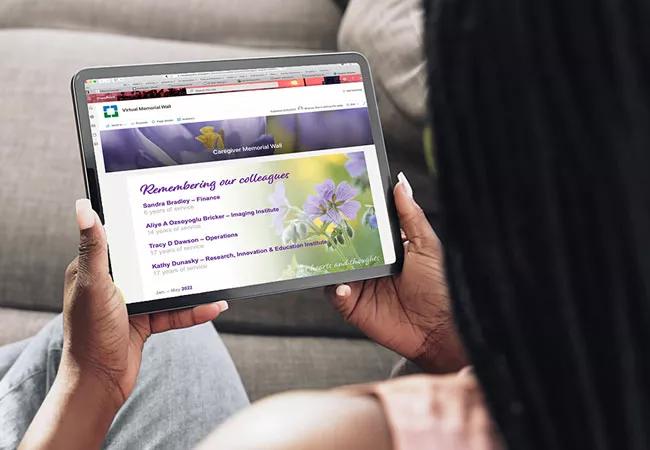Cleveland Clinic helps caregivers heal, pay tribute to colleagues who have died

The COVID-19 pandemic not only revealed how vulnerabilities in the healthcare system could affect patients, it highlighted the grief and uncertainty faced by healthcare workers everywhere. The global crisis presented Cleveland Clinic with a unique opportunity to examine the ways it could best support its caregivers’ emotional well-being when dealing with unprecedented loss.
Advertisement
Cleveland Clinic is a non-profit academic medical center. Advertising on our site helps support our mission. We do not endorse non-Cleveland Clinic products or services. Policy
“The heartache we saw with COVID-19 was a reminder that grieving and loss are relevant for each and every one of us,” explains Amy Freadling, PhD, LPCC-S, CEAP, Executive Director of Cleveland Clinic’s Caring for Caregivers program. “Our teams are filled with caregivers who make lifelong bonds with their colleagues, so when one of our caregivers passes away, it’s vital we support one another by honoring their legacy.”
Cleveland Clinic’s Caring for Caregivers program has long offered grief counseling and bereavement resources for caregivers who have lost someone close to them. In the wake of the pandemic, however, the caregiver team recognized that something was missing.
“We didn’t have a dedicated place where people could come together to honor beloved coworkers who had passed away,” Dr. Freadling explains. “We knew it was important for remaining team members to create a place where their feelings could be expressed, recognized and validated.”
It was time to realize an idea that had been waiting in the wings: using the intranet to pay tribute to caregivers who had lost their lives. In response to this need, Dr. Freadling worked with a multidisciplinary team to develop a Caregiver in Memoriam webpage, an interactive internal resource designed to honor caregivers who have died during their tenure at Cleveland Clinic.
The page allows caregivers to share their memories, add tributes and express their sorrow. Dr. Freadling notes that in an organization as large as Cleveland Clinic, the intranet is sometimes the first place caregivers learn about a colleague’s death.
Advertisement
“The webpage reinforces the importance of every caregiver’s contribution to our organization,” says Dr. Freadling. “We each have tremendous value in the eyes of our colleagues and the institution as a whole.”
The page also provides links to bereavement resources, including the Caring for Caregivers program, which provides confidential counseling and referrals to caregivers and their benefits-eligible dependents.
“The services we offer can address a variety of mental health issues, including stress, relationship problems, grief and anxiety,” says Dr. Freadling. “We want to provide a safe place where our caregivers can go to find support and potential solutions to their concerns.”
The in memoriam page also provides links to the Center for Spiritual Care, which offers a “grief and relief” line and bereavement support. In addition, the center can offer guidance to caregivers who would like to conduct or facilitate a memorial service for a departed colleague.
Caring for Caregivers has also established a Caregiver Support Team that coordinates condolence cards and food support for the departed caregiver’s family. In addition, the team creates a personalized memory book for the caregiver’s loved ones, which includes messages, poems and favorite photos that have been contributed by their Cleveland Clinic colleagues.
Dr. Freadling and her team are continuing to build these well-received programs and find new ways to support the institution’s caregivers.
“Our Caregiver in Memoriam page is just the final step in ensuring that a person has been well honored,” says Dr. Freadling. “It’s so important that we celebrate our caregivers throughout their entire careers and remember their contributions even after they’re gone. This human component is an integral part of what our institution stands for.”
Advertisement
For more information on any aspect of the Caring for Caregivers program, please contact Dr. Freadling at freadla@ccf.org.
Advertisement
Advertisement

A look at how personal stories sparked an enterprise-wide cultural reset

Interdisciplinary program fosters high-performance teams

1:1 guidance benefits individuals and organization

Strategies for building connections, staying present

Annual event galvanizes leaders and inspires excellence

Expert tips from Cleveland Clinic’s Chief Legal Officer

Groups move the metrics in environmental services and sterile processing

Initiative generates new ideas for improving efficiency, eliminating waste